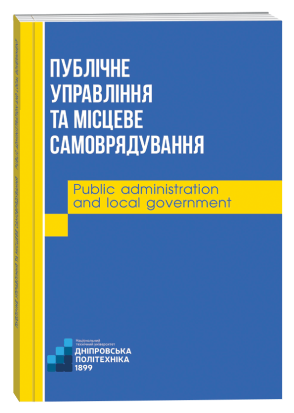EVALUATION OF PUBLIC POLICY AS AN INDICATOR OF ITS EFFECTIVENESS: EXPERIENCE FOR UKRAINE
DOI:
https://doi.org/10.32782/2414-4436/2023-1-9Keywords:
public administration, state efficiency, public actors, public administration effectivenessAbstract
Modern public policy evaluation is based on the principles of Good Governance, which are embedded in the methodology of all monitoring that exists at the global, regional and local levels. The problem of evaluation is very relevant for modern political systems that are in the process of adapting their national public policy models to current political, social and economic challenges. To date, there are three strategies for evaluating public policy used by states: first, it is related to the performance of public authorities, second, it is an analysis of the costs used in the process of implementing the policy, and third, it is a comprehensive indicator of costs and results. Modern models of policy and program evaluation are divided into two general groups depending on the entities that carry out the evaluation: internal and external. Internal evaluation is carried out by the public authority that implements the policy. External evaluation is carried out by independent experts or consultants. The evaluation of public policy by international think tanks is based on ideal-typical indicators of public policy and public administration efficiency, based on the principles of Good Governance, which demonstrate the quality of functioning of public policy institutions and the effectiveness of government, and are used in global indices. In Ukraine, which is gradually reforming its public administration model, public policy evaluation tools are actively used, which makes it possible to identify problems and design ways to overcome them even in times of war.
References
Dye T. Understanding Public Policy. Florida State University. 14’th Edition. 2013. 368 р.
Fernandes R. Public policies and social progress: Two evaluation models. Journal of Public Policy. 2022. Р. 1–16.
Human Resource Management & Information System (HRMIS). URL: https://www.techtarget.com/searchhrsoftware/definition/HRIS.
Morrison T. Actionable Learning. A Handbook for Capacity Building Through Case Based Learning. Tokyo : Asian Development Bank Institute, 2002. 515 p.
OECD. URL: https://stats.oecd.org/Index.aspx?Data SetCode=ITF_ACCESS.
SIGMA (Support for Improvement in Governance and Management). URL: https://par.in.ua/good-governance/sigma-principles.
Worldwide Governance Indicators (WGI). URL: http://info.worldbank.org/governance/wgi/index.asp.
Ведунг Е. Оцінювання державної політики і програм. Київ, 2003. URL: http://kyiv-heritage.com/sites/default/files/ВЕДУНГ%20-%20Оцінювання%20держ%20політики%20і%20програм%202003 %20352с.pdf.
Економічна і соціальна комісія ООН для Азіатсько-Тихоокеанського регіону (ESCAP). URL: http://www.unescap.org/pdd/prs/projectactivities/ ongoing/gg/governance.asp.
Концепція впровадження інформаційної системи управління людськими ресурсами в державних органах та затвердження плану заходів щодо її реалізації № 560-р від 20.05.2020 р. URL: https://zakon.rada.gov.ua/laws/show/844-2017-р#Text.
Організація економічного співробітництва і розвитку (ОЕСР). URL: http://stats.oecd.org/glossary/detail.asp?ID=7236.
Особливості оцінювання публічної політики: уроки для України / І.І. Петренко та ін. Актуальні проблеми політики. 2022. Вип. 69. С. 80–87.
Чальцева О.М. Публічна політика: теоретичний вимір і сучасна практика : монографія. Вінниця : ФОП Барановська Т.П., 2017. 336 с.






